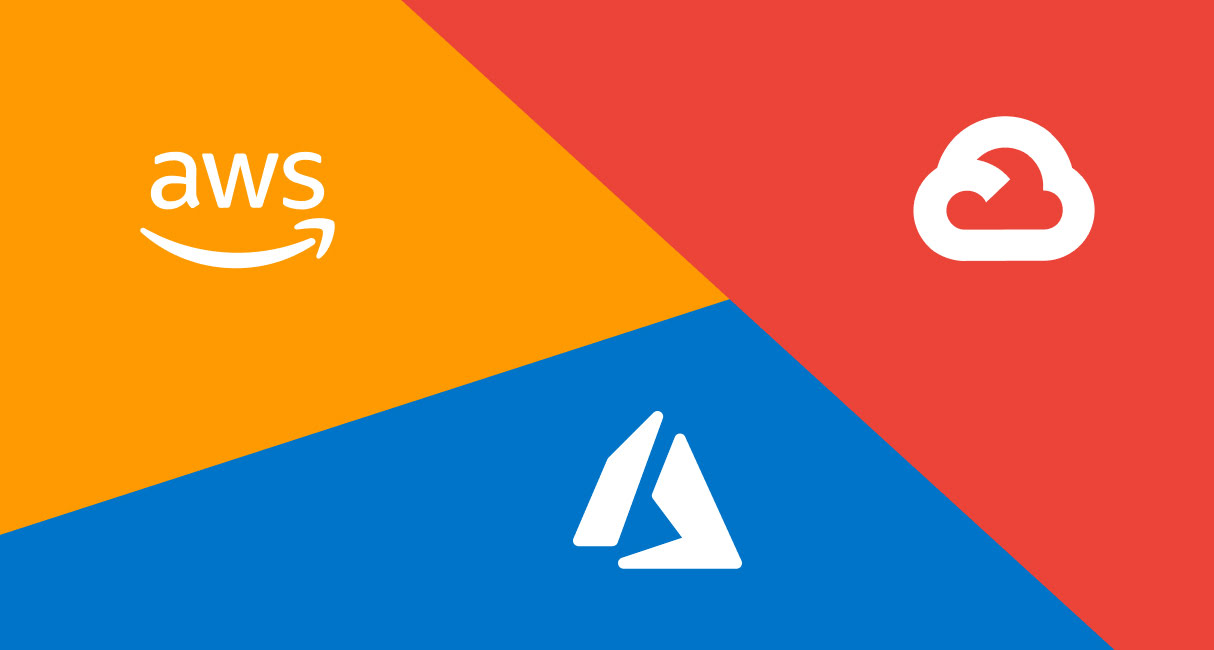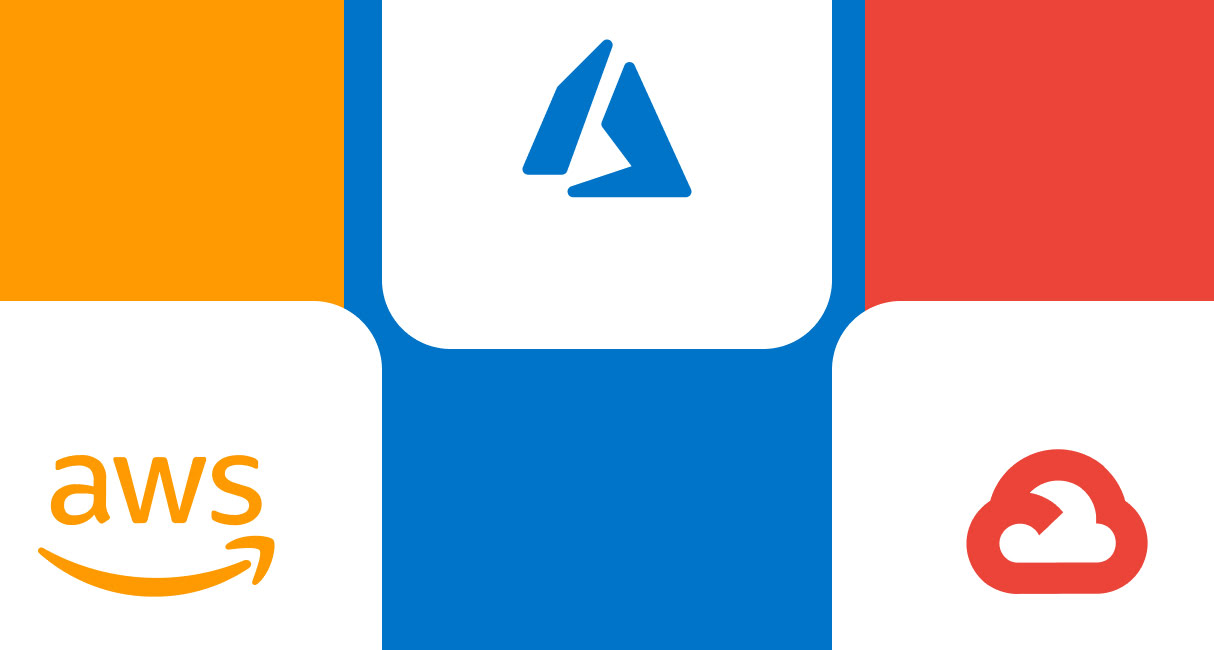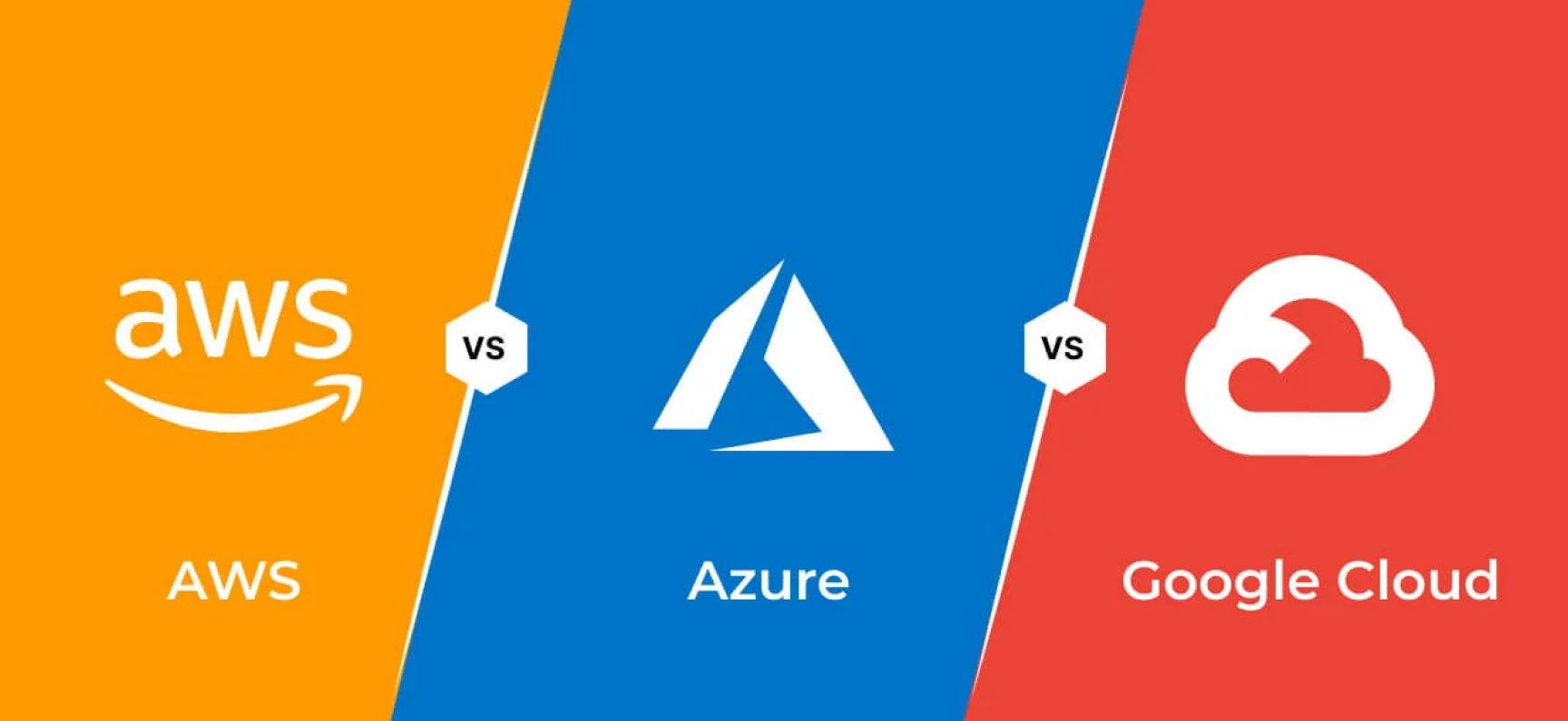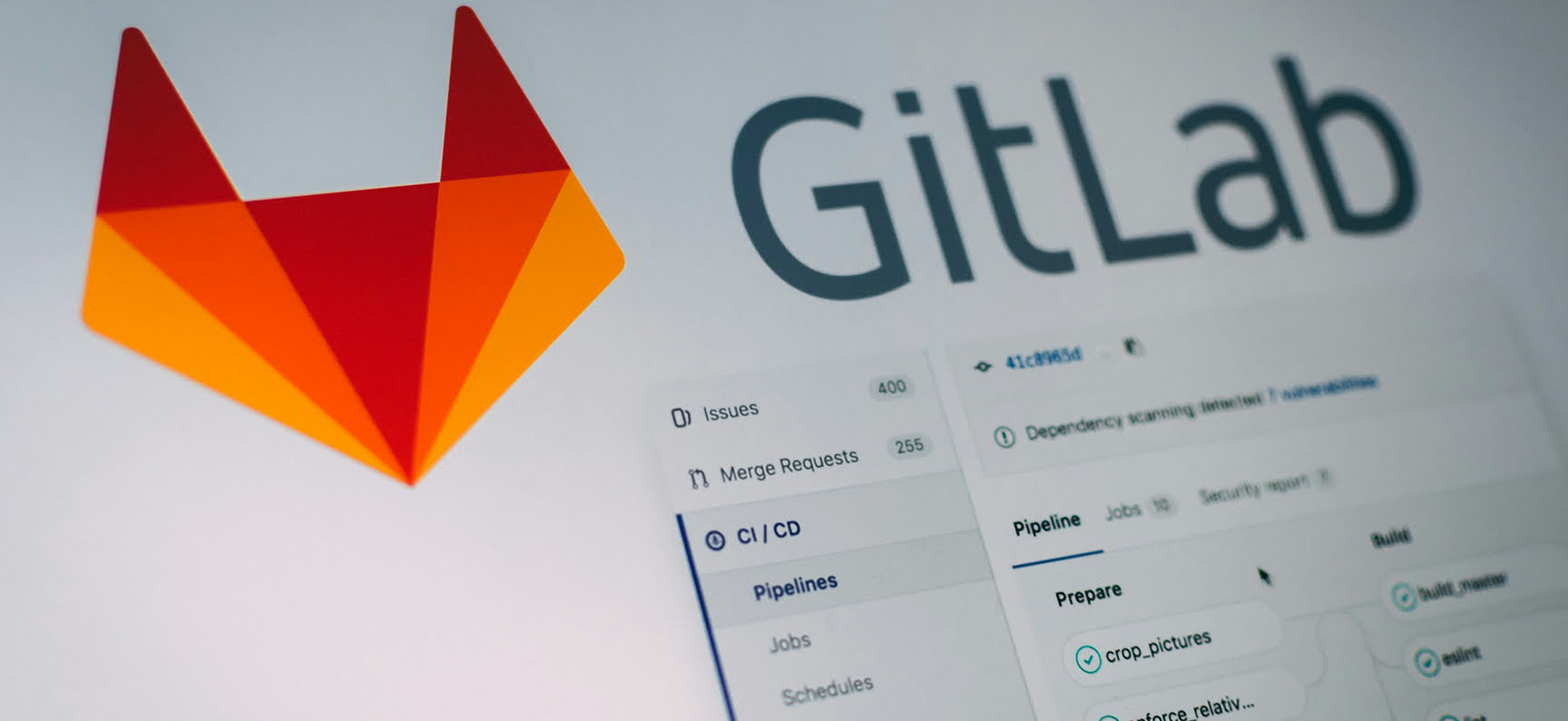In the ever-growing world of cloud computing, businesses are often faced with the challenge of choosing the best cloud provider. With major players like Amazon Web Services (AWS), Microsoft Azure, and Google Cloud Platform (GCP) dominating the landscape, selecting the right cloud service provider is a critical decision. Each of these providers offers unique strengths, features, and pricing models, so understanding their differences can help determine which platform aligns with your business needs.
The global cloud infrastructure services market was valued at USD 142.35 billion in 2024 and is expected to grow from USD 158.89 billion in 2025 to USD 396.01 billion by 2032, with a CAGR of 13.9% during the forecast period. This highlights the increasing demand for cloud solutions, which makes it essential to carefully compare Amazon Web Services vs Google Cloud vs Azure to determine the best fit for your business needs. In this article, we'll delve into an in-depth comparison of Amazon AWS vs Azure vs Google Cloud services comparison to help you make an informed decision.
What is the Difference between AWS vs Azure vs Google Cloud?
As businesses increasingly adopt cloud computing to manage their infrastructure and applications, choosing the right virtual platform becomes a pivotal decision. Amazon Web Services (AWS), Microsoft Azure, and Google Cloud (GCP) have established themselves as the top players in the cloud services market, each offering unique capabilities and specialized features. When considering GCP vs AWS vs Azure, it's important to evaluate each platform’s strengths and weaknesses based on your business needs, budget, and technical requirements.
What is AWS?
Amazon Web Services (AWS) is the cloud platform provided by Amazon, offering a vast array of services that cater to computing, storage, networking, databases, machine learning, analytics, and more. AWS is known for its reliability, scalability, and extensive global infrastructure, making it a popular choice for both large enterprises and startups. It leads the market in terms of revenue and popularity, with thousands of services available to cater to different business requirements.
What is Azure?
It is a cloud computing service provided by Microsoft, designed to support a variety of workloads, from virtual machines and storage to databases and AI-powered services. With a clear focus on enterprise solutions, it ensures security and scalability, key factors when businesses consider security comparison and revenue margins. If you're wondering which provider is best for long-term scalability, Azure’s seamless integration with Microsoft’s enterprise tools makes it a compelling option for many businesses.
What is Google Cloud?
Google Cloud Platform (GCP) is Google’s suite of cloud services, offering compute, storage, database, networking, machine learning, and developer tools. For startup companies looking to leverage advanced machine learning tools and AI managed services, Google Cloud is an ideal choice. As businesses grow, Google Cloud’s focus on cloud-native application development and cost-effective scaling options position it as which is right for you, depending on your business’s list of features needed.

AWS vs Azure vs Google Cloud: Key Differences
Choosing the right cloud platform for your business involves more than just technical features; it’s about selecting a platform that aligns with your business objectives, scalability needs, and budget. Microsoft Azure vs Google Cloud vs AWS each offer unique features, tools, and services, making them better suited for different business use cases.

Feature comparison of Microsoft Azure vs Amazon Web Services vs Google Cloud shows that Azure excels in hybrid solutions, while AWS leads in overall virtual service offerings. Let’s dive into the key differences between AWS, Azure, and GCP to help you make the right decision for your business.
Expert Opinion «In our experience, selecting the right cloud provider depends on data center locations, available services, and cost efficiency. We prioritize providers with data centers close to our users to ensure low latency and meet compliance requirements. The choice of services is equally important—some workloads require specialized AI and analytics tools, while others need robust networking or hybrid cloud support. Cost is another key factor, as pricing structures vary based on usage, storage, and network fees. By evaluating these aspects, we ensure our cloud strategy aligns with performance needs, regulatory requirements, and budget constraints.»Daniil Bakanov DevOps Engineer at ARTJOKER
Comparing AWS, Azure, and GCP Compute Services
Amazon AWS vs Google Cloud vs Microsoft Azure offers different compute services. AWS provides a broad range of compute services, with EC2 instances being the core offering. Azure, on the other hand, provides Virtual Machines (VMs) and Azure Functions, with a stronger focus on hybrid deployments. GCP’s compute services include Google Compute Engine (GCE) and Google Kubernetes Engine (GKE), particularly appealing to businesses relying on containerized applications.
AWS is better for large-scale enterprises with high computing demands, while Azure is favored for companies with a mix of on-premises and virtual infrastructure. Google Cloud’s strong suit is its leadership in container management and Kubernetes development.
Comparing AWS, Azure, and GCP Database and Storage Services
In terms of databases and storage, Amazon Web Services (AWS) offers a variety of options such as RDS, DynamoDB, and S3, with strong support for relational and NoSQL databases. Microsoft SQL Database and Blob Storage compete similarly, but it also offers deep integration with Microsoft-based services, making it a preferred choice for businesses already leveraging Microsoft products. Google Cloud Platform (GCP) provides Cloud SQL, Bigtable, and Cloud Spanner, focusing on both relational and NoSQL databases.
When performing an Azure vs AWS vs GCP services comparison, AWS typically provides a wider selection of database options, offering greater flexibility. However, Microsoft Azure vs Amazon AWS vs Google Cloud in terms of integration with enterprise systems may sway businesses towards Azure if they are already embedded within the Microsoft ecosystem. GCP stands out for its big data services, making it a go-to for businesses requiring robust data analytics and processing capabilities, especially for cloud-native applications.
Comparing AWS, Azure, and GCP Networking Services
Networking services are critical for scaling and managing virtual environments, and each cloud provider offers unique features. Amazon Web Services (AWS) provides services such as VPC, Direct Connect, and CloudFront, offering flexibility and extensive customization. Microsoft also offers similar services with Virtual Network, ExpressRoute, and Content Delivery Network (CDN) features. Google Cloud Platform (GCP) focuses on high-performance networking with services like Cloud VPC and Cloud Interconnect, as well as advanced networking features for enterprises.
When conducting an Amazon Web Services vs Microsoft Azure vs Google Cloud Platform cost comparison, AWS offers extensive customization for network management, making it a top choice for businesses requiring high levels of flexibility. On the other hand, differences between AWS, Microsoft Azure, and Google Cloud show that Azure’s integration with Microsoft enterprise solutions makes it a preferred option for companies already leveraging those tools. GCP’s performance-driven approach to networking services makes it particularly suitable for enterprises that require highly optimized networking.
Specialized Services
While AWS has the most expansive list of general-purpose services, Azure and GCP excel in certain niche offerings. Azure shines in hybrid virtual solutions, particularly with Stack, which allows businesses to extend platform capabilities to on-premises environments. Google excels in machine learning, AI, and data analytics, with products like BigQuery and TensorFlow.
Hybrid and Multi-cloud Options
Both Azure and AWS provide hybrid options, with Azure being particularly strong in hybrid offerings due to its integration with Microsoft’s enterprise software solutions. Google is catching up with its multi-cloud capabilities, but AWS remains the most popular choice for businesses looking to create hybrid and multi-cloud architectures.
AWS vs Azure vs Google Cloud: Price Comparison
Many businesses wonder, cheaper AWS or Azure or Google Cloud, and the answer depends on factors such as compute, storage needs, and long-term scalability. When evaluating virtual providers for your business, it's essential to understand the pricing structures of Amazon Web Services (AWS), Microsoft Azure, and Google Cloud Platform (GCP). Below is a comparative overview of their pricing for key services, focusing on general-purpose compute instances and standard storage options. This will help you compare AWS vs Azure vs GCP pricing to find the best solution for your business needs.
Compute Services Pricing
Below is a comparative table outlining the price comparison of AWS vs Azure vs Google Cloud services for general-purpose compute instances.
| Provider | Instance Type | vCPUs | RAM (GB) | Hourly Rate |
| AWS | t4g.xlarge | 4 | 16 | $0.1344 |
| Azure | B4ms | 4 | 16 | $0.166 |
| GCP | e2-standard-4 | 4 | 16 | $0.150924 |
Storage Services Pricing
To help you make an informed decision, we will compare the prices of AWS, Azure and Google Cloud Platform for their storage services.
| Provider | Service | Cost per GB/Month |
| AWS | S3 | $0.023 |
| Azure | Blob Storage | $0.021 |
| GCP | Cloud Storage | $0.023 |
Key Observations:
- Compute Instances: According to price comparison, AWS offers a lower hourly rate for general-purpose instances compared to Azure and GCP.
- Storage Costs: Azure provides a slightly more cost-effective storage solution than AWS and GCP.
Additional Considerations:
- Pricing Models: All three providers offer various pricing models, including on-demand, reserved instances, and sustained use discounts.
- Scaling Costs: As your business scales, both compute and storage costs will increase. It's crucial to monitor usage and optimize resource allocation to manage expenses effectively.
- Hidden Costs: Be aware of additional charges such as data transfer fees, network costs, and costs associated with advanced features or premium support plans.
Recommendations for Small to Medium Businesses:
- Assess Workloads: Determine your specific compute and storage needs to select the most cost-effective instance types and storage options.
- Utilize Pricing Calculators: Each provider offers pricing calculators to estimate costs based on your anticipated usage.
- Consider Long-Term Commitments: If you have predictable workloads, exploring reserved instances or committed use discounts can lead to significant savings.
- Monitor Usage: Regularly review your virtual usage and adjust resources as needed to avoid unnecessary expenditures.
Key Tools: AWS, Azure, and Google Cloud
Each cloud platform offers a variety of tools designed to address specific business needs, from infrastructure management and web application development to storage and analytics. These tools empower businesses to scale their operations and leverage the full potential of virtual technology.
AWS Key Tools
AWS provides a comprehensive set of tools that support a wide range of business applications, from storage to computing and machine learning. Some of the key tools available in AWS include:
- Amazon EC2: Provides scalable computing capacity in the cloud, allowing businesses to run applications on virtual machines.
- AWS Lambda: A serverless compute service that lets you run code without provisioning or managing servers, simplifying the management of back-end services.
- Amazon RDS (Relational Database Service): A managed database service for running databases like MySQL, PostgreSQL, and SQL Server with built-in scaling and backup capabilities.
- Amazon S3 (Simple Storage Service): A widely-used object storage service for storing and retrieving any amount of data at any time, ideal for backup, archival, and serving large data sets.
- Amazon VPC: Enables businesses to create isolated networks within the AWS cloud, providing control over network configurations like IP addressing and routing.
- AWS IAM (Identity and Access Management): Provides secure control over access to AWS resources, allowing businesses to define and enforce policies for user permissions.
These tools help businesses optimize their infrastructure, improve operational efficiency, and scale according to demand.
Azure Key Tools
Microsoft Azure offers a broad selection of tools that cater to enterprises with complex needs, especially those who are already invested in Microsoft technologies. Key tools in the ecosystem include:
- Virtual Machines: Provides scalable computing resources, allowing businesses to run Windows and Linux workloads in the cloud.
- Blob Storage: A flexible storage solution for unstructured data like documents, images, and videos, suitable for big data applications.
- Kubernetes Service: A managed service that simplifies the deployment, management, and scaling of containerized applications.
- Functions: A serverless compute service that allows businesses to run event-driven code without managing infrastructure, supporting microservices architectures.
- Active Directory: A cloud-based identity and access management solution that integrates with Microsoft tools and provides enterprise-grade security.
- Monitor: Provides full-stack monitoring capabilities to track the performance and health of your applications and infrastructure.
These tools are highly integrated with other Microsoft products and make Azure a compelling choice for businesses that already rely on Microsoft services.
Google Cloud Key Tools
Google Platform offers a strong focus on machine learning, analytics, and scalability. Its suite of tools is designed to help businesses manage big data, containers, and complex workloads. Key Google tools include:
- Google Compute Engine: A flexible and scalable compute resource that enables businesses to run virtual machines in Google infrastructure.
- Google Kubernetes Engine (GKE): A managed service for running Kubernetes clusters, offering robust container orchestration with Google's native infrastructure.
- BigQuery: A powerful data warehousing and analytics platform that enables businesses to analyze massive datasets quickly and cost-effectively.
- Google Functions: A serverless computing service that allows businesses to run event-driven code in response to events without managing the underlying infrastructure.
- Google Storage: A scalable object storage service for storing large datasets, backups, and multimedia files, with a focus on cost-efficient solutions.
- Google Pub/Sub: A messaging service for building real-time event-driven systems, enabling businesses to decouple services and process streams of data.
With its strengths in data analytics and machine learning, Google Cloud is particularly favored by businesses involved in big data, AI, and real-time analytics applications.
Benefits and Considerations of AWS, Azure, and Google Cloud
When deciding between AWS, Azure, and Google Cloud for your business, it's crucial to weigh the benefits and challenges each platform presents. The right choice depends on your organization's specific needs, from cost-effectiveness and scalability to the ability to integrate advanced technologies like AI or machine learning. Understanding the difference between AWS and Azure and Google Cloud Platform is essential, as each cloud provider brings different strengths to the table.
For example, AWS might be the better AWS or Azure or GCP option depending on your specific requirements, with AWS offering extensive scalability for large enterprises, Azure excelling in hybrid cloud solutions, and Google Cloud being a leader in AI and machine learning. Let’s take a closer look at the pros and cons of each platform to help you make an informed decision.
Pros and Cons of Amazon Web Services (AWS)
Pros:
- Comprehensive Service Portfolio: AWS is widely regarded as the most robust cloud platform, offering an expansive range of services covering everything from compute, storage, and databases to machine learning, security, and IoT.
- Global Reach: AWS has the largest infrastructure network worldwide, offering data centers in nearly every region. This global presence allows businesses to deploy applications closer to their users, reducing latency and improving performance.
- Highly Scalable: AWS offers strong scalability for businesses of all sizes. With services like Amazon EC2 (Elastic Compute Cloud) and auto-scaling, AWS can handle everything from small applications to massive enterprise solutions.
- Security: AWS is known for its high security standards, providing enterprise-level protection with encryption, access controls, and compliance with various industry standards, such as HIPAA, PCI-DSS, and GDPR.
Cons:
- Complex Pricing: One of the most significant drawbacks of AWS is its complex pricing model. While AWS offers a pay-as-you-go model, understanding the full scope of costs associated with its many services can be challenging. Small businesses and startups often face unpredictably high bills as their usage grows.
- Steep Learning Curve: Due to its vast array of services, AWS can be overwhelming, particularly for smaller businesses or teams with limited DevOps expertise. The platform requires a certain level of expertise to manage effectively.
- Support Costs: AWS's support services can be expensive, and without the right support plan, troubleshooting or receiving assistance can become a time-consuming and costly process.
Pros and Cons of Microsoft Azure
Pros:
- Seamless Integration with Microsoft Products: Azure is an excellent choice for businesses already using Microsoft software like Office 365, Windows Server, or Active Directory. The platform provides out-of-the-box integration with these products, enabling businesses to easily migrate and extend their existing workloads to the cloud.
- Hybrid Cloud Capabilities: Azure shines in hybrid cloud environments. With tools like Azure Arc, businesses can seamlessly manage workloads that span on-premises, multi-cloud, and edge environments, making it a great option for organizations with legacy systems that need to be integrated with modern cloud solutions.
- Enterprise-Grade Security: Azure offers robust security features, including advanced threat protection, encryption, and compliance certifications, making it a strong choice for businesses in regulated industries such as healthcare and finance.
Cons:
- Limited Global Reach Compared to AWS: While Azure is expanding its global data center footprint, it still lags behind AWS in terms of the number of regions and availability zones, which can impact businesses looking for the broadest global coverage.
- Less Comprehensive Ecosystem: While Azure is rich in enterprise features, it does not offer the same extensive catalog of services that AWS does. Certain advanced services like AI and machine learning tools may not be as mature or feature-rich as those offered by AWS.
- Complexity in Management: Azure can be difficult to navigate for newcomers or businesses without dedicated DevOps teams. Some users find the management console and interface more complex compared to AWS’s or GCP’s more intuitive designs.
Pros and Cons of Google Cloud Platform (GCP)
Pros:
- Leader in AI and Data Analytics: GCP excels in artificial intelligence and machine learning, particularly for organizations looking to leverage data-driven solutions. Google’s machine learning tools, such as TensorFlow, are widely regarded as industry-leading.
- Strong in Big Data and Analytics: Google Cloud provides some of the best tools for big data analysis, such as BigQuery and Dataflow, enabling businesses to process and analyze large datasets quickly and cost-effectively.
- Price Flexibility: GCP offers competitive pricing with unique billing models, such as sustained use discounts, which lower costs as you use resources for longer periods. Google Cloud’s pricing structure is also generally simpler and more transparent than AWS’s.
- Open-Source Integration: GCP’s strong emphasis on open-source technologies, like Kubernetes, makes it appealing to developers who want flexibility and want to build cloud-native applications.
Cons:
- Smaller Market Share: While Google Cloud is growing, it lags behind AWS and Azure in terms of market share and enterprise adoption. This can sometimes result in fewer community resources, third-party integrations, and a smaller talent pool.
- Limited Enterprise Support: Google Cloud's support for large-scale enterprise applications is still evolving. Some businesses may find that it lacks the enterprise support and specific features required by larger organizations.
- Smaller Global Reach: Although GCP has expanded globally, it has fewer data centers than AWS and Azure, which can be a concern for businesses with customers in more remote locations.
Which Cloud Platform Should I Choose for My Business?
When deciding on the best cloud platform for your business, it's important to consider not only the technical features of Amazon Web Services (AWS), Microsoft Azure, and Google Cloud Platform (GCP), but also how these platforms align with your business goals, operational needs, and budget. Whether you are a startup with limited DevOps resources, or a growing enterprise with plans to scale, choosing the right platform can have a major impact on both your cost-efficiency and ability to innovate. The question of which is better often depends on your unique requirements. For example, AWS is better than Azure and GCP in terms of scalability for large enterprises, but Google Cloud Platform differ from Amazon and Azure in terms of AI managed services and machine learning offerings. Understanding these differences can help you choose between AWS, Azure and Google Cloud, ensuring the right fit for your business.

Considerations for Choosing the Right Cloud Provider
1. Cost-Effectiveness:
If cost is a key consideration, it’s important to assess the pricing models of each cloud provider. AWS and Azure are generally considered more expensive at scale, while GCP’s pricing can be more cost-effective for certain use cases, especially for businesses that need to scale compute instances over time. However, it’s important to assess not only the base pricing but also hidden costs like data transfer fees and additional services. For businesses just starting, Azure and GCP may be more affordable at first, especially with the discounts and sustained-use pricing they offer. AWS can be more cost-effective once you’re able to optimize your usage across larger infrastructure and long-term contracts.
2. Scalability:
As businesses scale, the cloud platform’s ability to handle increased demand without significant performance degradation becomes critical. If your business expects rapid growth, AWS and Azure offer highly scalable infrastructure, with AWS providing more mature offerings and an extensive global network. Google Cloud, on the other hand, excels at managing large-scale, compute-intensive workloads like big data and AI, making it ideal for businesses focused on Cloud-native application development and those integrating AI managed services into their operations. The difference between AWS and Azure and Google Cloud Platform lies in how each platform can handle such growth.
3. Ease of Use & DevOps Resources:
For businesses with limited DevOps resources, Azure is often a better option due to its user-friendly interface and tight integration with Microsoft products, making it easy for teams already familiar with the Microsoft stack to get started. AWS, while powerful, has a steeper learning curve due to its extensive set of services. GCP offers simplicity in certain aspects but requires more configuration compared to Azure. For teams leveraging AWS DevOps services or Azure DevOps services, the choice of platform becomes even more crucial, as each integrates differently into existing workflows, impacting deployment speed and resource management.
4. Multi-cloud and Hybrid Cloud Needs:
If your business is planning on using multiple cloud providers or deploying a hybrid cloud environment, Azure provides excellent multi-cloud support through tools like Azure Arc, making it a strong candidate. AWS and GCP are also capable of multi-cloud deployments, but Azure’s hybrid approach, especially when integrating with on-premises systems, makes it particularly appealing to enterprises looking for flexibility. Understanding the differences between AWS, Microsoft Azure, and Google Cloud when it comes to hybrid cloud solutions will help you decide which is better suited for your business.
5. Security and Compliance:
For businesses in regulated industries, security and compliance are paramount. AWS and Azure offer robust security measures and compliance certifications for various industries, including finance, healthcare, and government. GCP is also secure but may not have the same depth of compliance certifications as AWS or Azure in certain industries. If best security is a key requirement for your business, both AWS and Azure have a more comprehensive security framework compared to GCP, making them ideal for industries with strict regulatory requirements.
6. Specialized Services & Innovation:
If your business relies heavily on artificial intelligence and machine learning, Google Cloud has the edge with its AI and ML tools such as TensorFlow and Google AI Platform. AWS and Azure also offer similar capabilities, but GCP stands out due to its deep integration with Google’s AI-powered products, which could be a game-changer for businesses working on data analytics and machine learning applications. When choosing between AWS, Azure, and Google Cloud, businesses must consider which provider offers the best cloud services for businesses that prioritize AI managed services.
Decision-Making Table
| Criteria | AWS | Azure | GCP |
| Cost for Startups | More expensive at scale | More affordable initially | Very cost-effective for small workloads |
| Scalability | Best for large enterprises | Excellent, with hybrid flexibility | Excellent for AI, big data, and cloud-native apps |
| DevOps Resources | High learning curve | Easier for Microsoft-based teams | Simple but requires configuration |
| Multi-cloud & Hybrid Needs | Good support for hybrid cloud | Best for hybrid deployments | Strong multi-cloud flexibility |
| Security & Compliance | Most comprehensive compliance | Excellent security and compliance | Adequate, but fewer certifications |
| Specialized Services (AI/ML) | Strong AI/ML support | Good integration with Microsoft AI | Leading in AI/ML innovation |
| Global Reach | Largest global infrastructure | Strong in Europe and Asia | Great for large-scale analytics and data-heavy apps |
Which Provider Is Best for You?
For startups or businesses with limited DevOps resources: Azure could be the best choice due to its integration with existing Microsoft tools, ease of use, and cost-effective pricing options.
For large-scale enterprises requiring deep customizability and a wide range of services: AWS is a clear contender, offering the most mature service portfolio with excellent scalability.
For businesses focusing on Cloud-native applications, AI, and Big Data: Google Cloud offers the most advanced machine learning tools and cost-effective pricing for compute-intensive applications, making it an excellent option for innovative startups or data-driven businesses.
Conclusion
When choosing between AWS, Azure, and Google Cloud, businesses must consider a variety of factors including pricing, scalability, ease of use, security, and the specific services they need. Each platform offers unique benefits depending on your business model and future growth goals.
AWS is often the preferred choice for large enterprises that require robust, scalable infrastructure with an extensive range of services. It’s particularly suitable for businesses with complex needs and substantial cloud computing demands. However, AWS can become expensive at scale, and its pricing model can be complex for startups or small businesses without dedicated DevOps resources.
Azure stands out for businesses looking for seamless integration with Microsoft tools and services. Its hybrid cloud capabilities make it an excellent choice for businesses that require both on-premises and cloud infrastructure. It’s also more cost-effective for startups or smaller companies that are already invested in the Microsoft ecosystem.
Google Cloud excels in areas like machine learning, AI, and data analytics. If your business focuses heavily on data-driven applications, cloud-native development, or cutting-edge technologies like Kubernetes, GCP may be the best fit. Google Cloud also provides competitive pricing, especially for businesses dealing with large-scale data or machine learning workloads.
Struggling to choose the right cloud platform? Our cloud experts will analyze your business needs, compare AWS, Azure, and Google Cloud, and create a cost-effective cloud strategy tailored to your goals. Book a free consultation today and take the guesswork out of cloud adoption.
Similar articles
View allyour business
together
- PROJECT INQUIRIES info@artjoker.net
- CALL US +1 213 423 05 84
contact us:












